10 Years of Trans Rights Mapping in Europe & Central Asia: Decade-long Research Reveals Overall Progress, While UK & Hungary Go Backwards
For the International Day Against Homophobia, Biphobia, and Transphobia 2023, we look back at data from the past 10 years of our Trans Rights Map.
Main takeaways
- Non-Discrimination had the biggest and most continuous legal gains for trans people in Europe in the past decade.
- Considerable progress was made in the last decade in removing discriminatory requirements for legal gender recognition.
- The past decade saw a fivefold increase in the number of states offering Asylum protection in law, but implementation needs to improve massively.
- Progress in both the Family and Health policy categories is painfully slow.
- The UK’s ranking went from 1st in 2013 to 21st in 2023, while Hungary dropped from 2nd to 29th.
- Iceland, Malta, and Luxembourg are at the top in 2023, with major progress since 2013.
Legal gender recognition
The availability of a procedure to change gender markers on official documents to match gender identity improved over the past decade. In 2013, there were legal or administrative procedures in 34 countries, versus 41 today (+7, +20%). There was new progress in 2023 after a downturn between 2019 and 2021, during which all procedures were removed in Hungary and Kyrgyzstan. Similar anti-trans attacks currently threaten legal gender recognition in Slovakia.
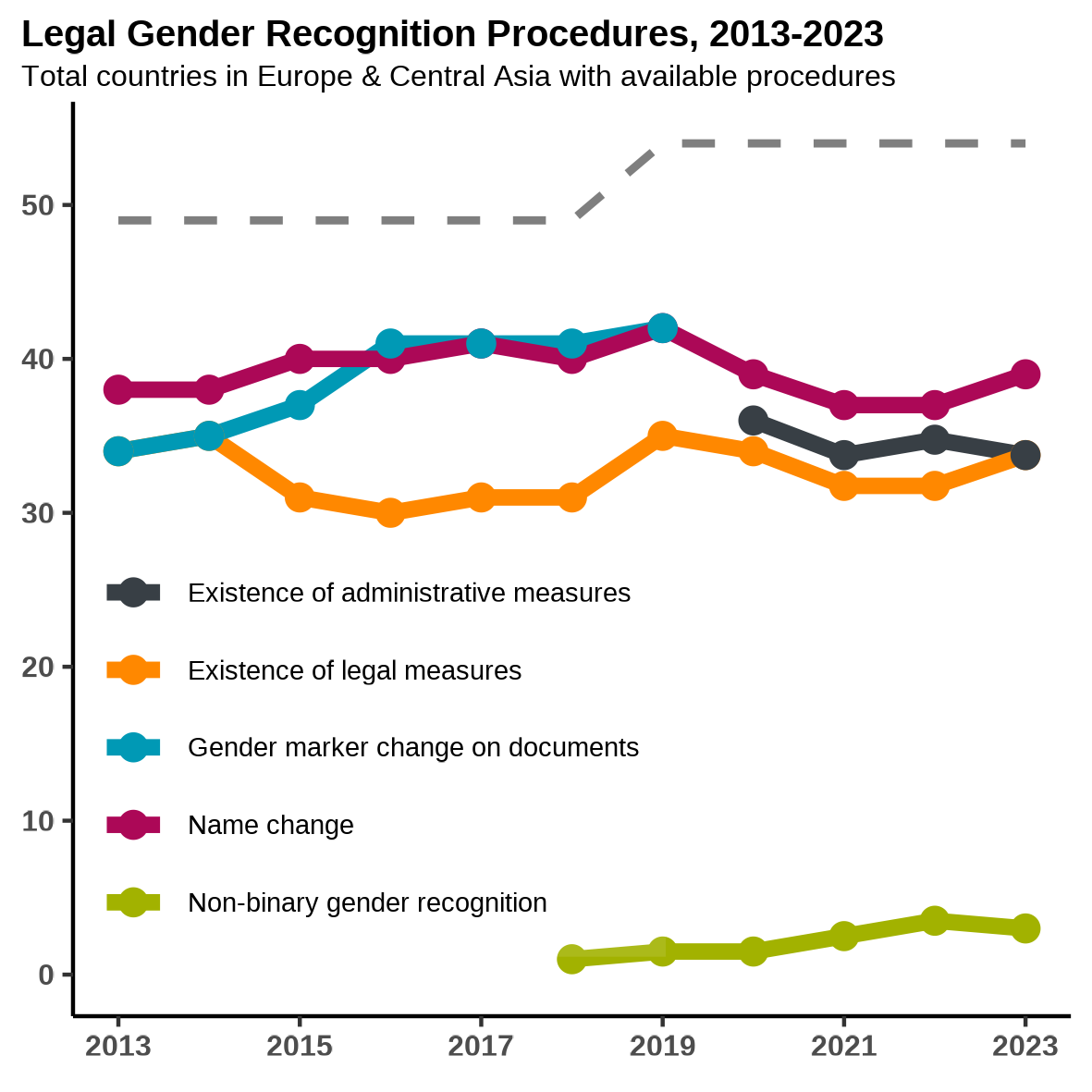
Considerable progress was made in the last decade in removing discriminatory requirements for legal gender recognition. The number of states requiring sterilisation by law was halved (2013: 24; 2023: 11). Likewise, far fewer states have surgical and medical requirements for legal gender recognition compared to a decade ago.
In 2013, all European countries required a mental health diagnosis to access legal gender recognition. Since then, this requirement has been removed in 13 states, with 11 of these states achieving full self-determination. This means that legal gender recognition is based on the declaration of the individual concerned, without any third party involvement. However, the overall number of countries removing the divorce restriction before legal gender recognition has not increased at the same pace as the other areas.
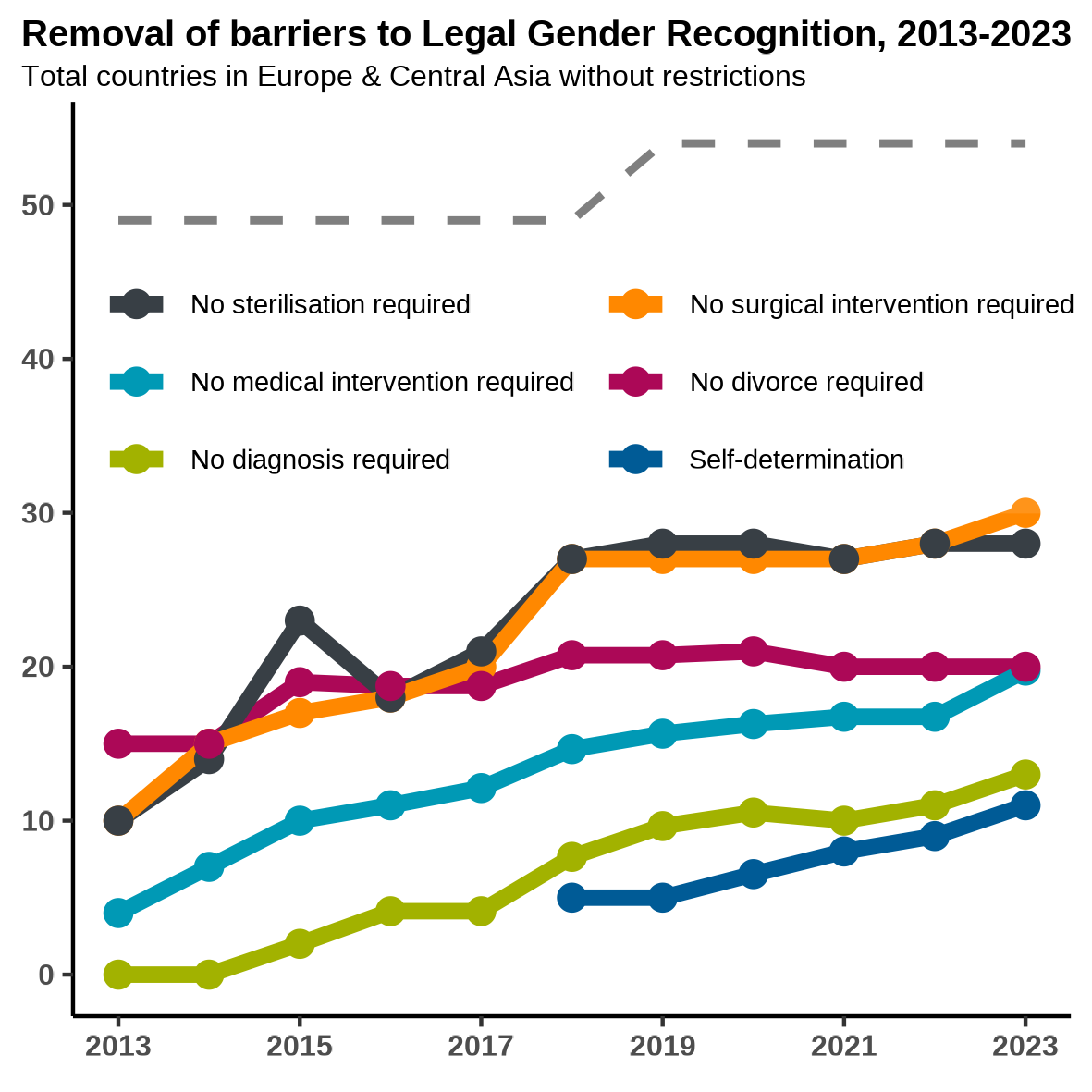
Access to legal gender recognition for trans youth remains far below that of adults. In this area, we see stagnation and even recent regression, with new age restrictions for legal gender recognition introduced in Switzerland (2021) and Spain (2023). Policymakers need to do more to protect trans youth. This age group reports the most harassment of all trans people in Europe, and is the least likely to be open about their gender identity (EU FRA, 2019).
Non-binary people are also let down by slow progress in legal recognition of more than two genders – only Iceland and Germany have achieved this fully, while Denmark and Malta offer partial recognition. This is despite data suggesting that non-binary people make up 51% of all trans people in Europe (EU FRA, 2019).
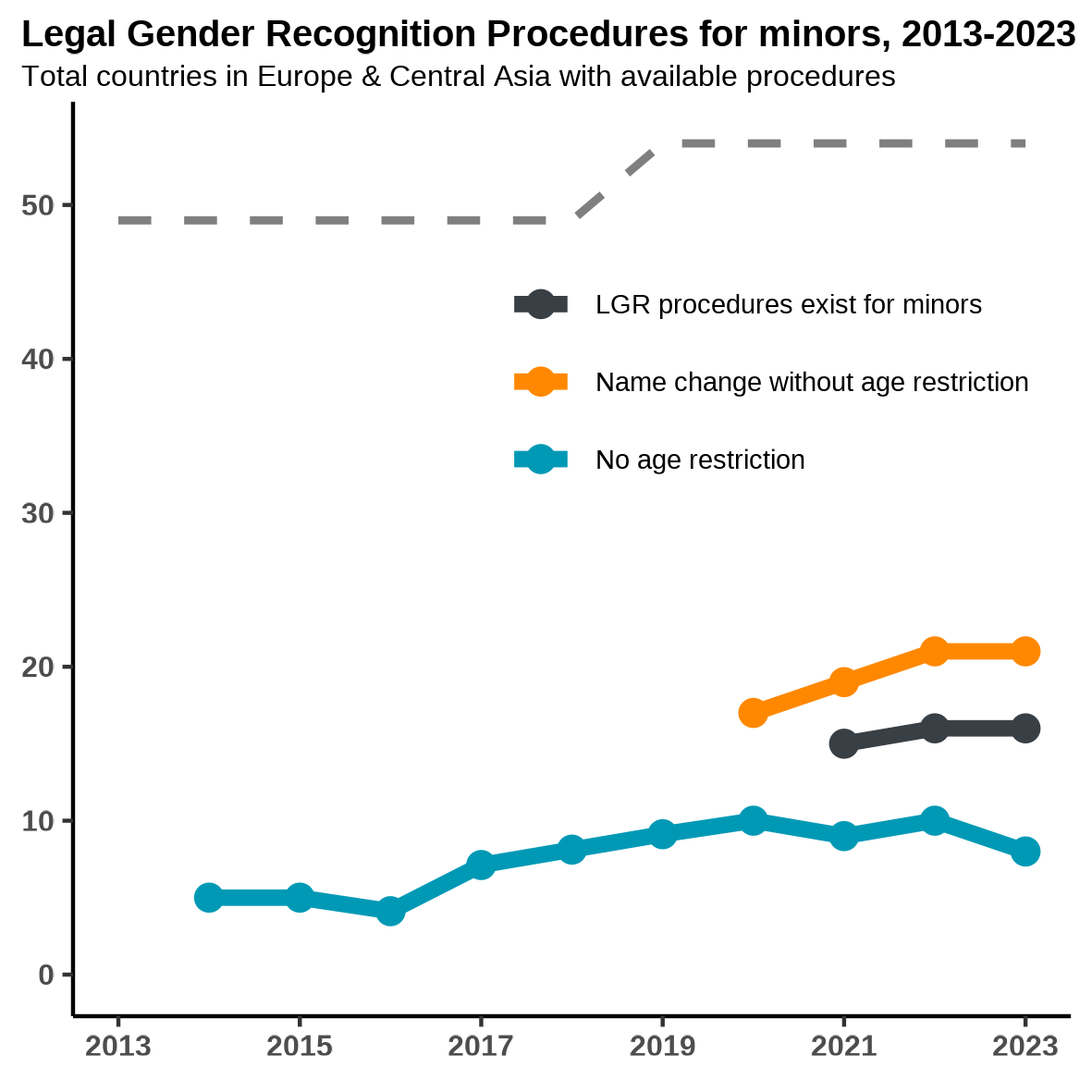
Asylum
The past decade saw a fivefold increase in the number of states offering asylum protection in law (2013: 5; 2023: 27). While this is a big increase, half of the countries in Europe and Central Asia still do not offer asylum protection (27). A third of these (8) are EU member states, in violation of EU law. Even states with asylum laws that cover persecution on grounds of gender identity need better implementation to avoid further failing trans asylum seekers. Current plans to outsource asylum procedures to EU external borders also threaten the chances of asylum seekers receiving fair procedures, including trans and gender diverse persons.
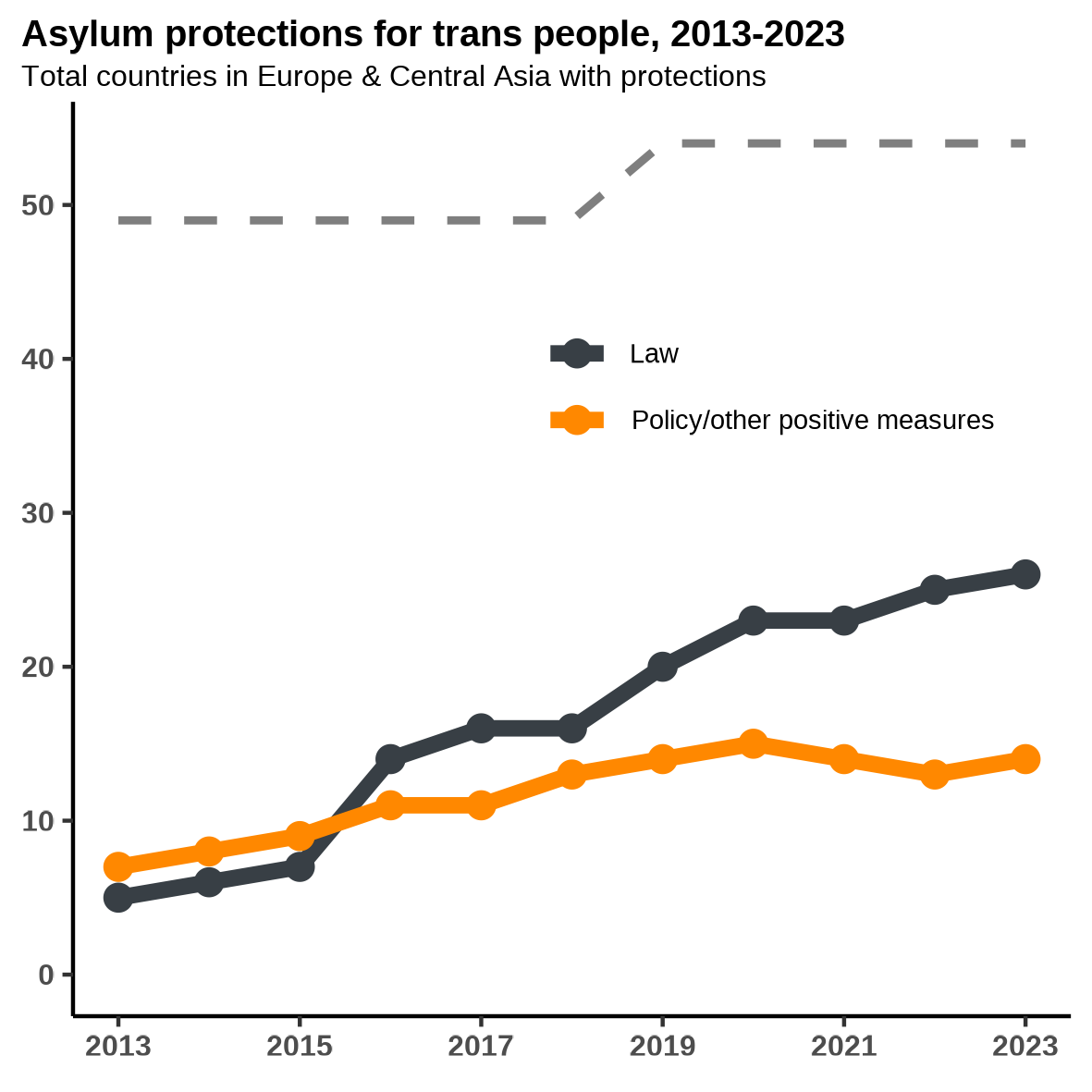
Hate crimes & hate speech protections
Over the past decade, the number of countries adopting a hate crime law covering trans people tripled (2013: 8; 2023: 23) and the number with a hate speech law covering gender identity has nearly quadrupled (2013: 5; 2023: 19). Despite this, there is actually regression in the number of states with a policy tackling hatred against trans people. This suggests that governments are still not ready to proactively intervene to protect trans people living in their country, while anti-trans rhetoric and consequential violence are reportedly on the rise.
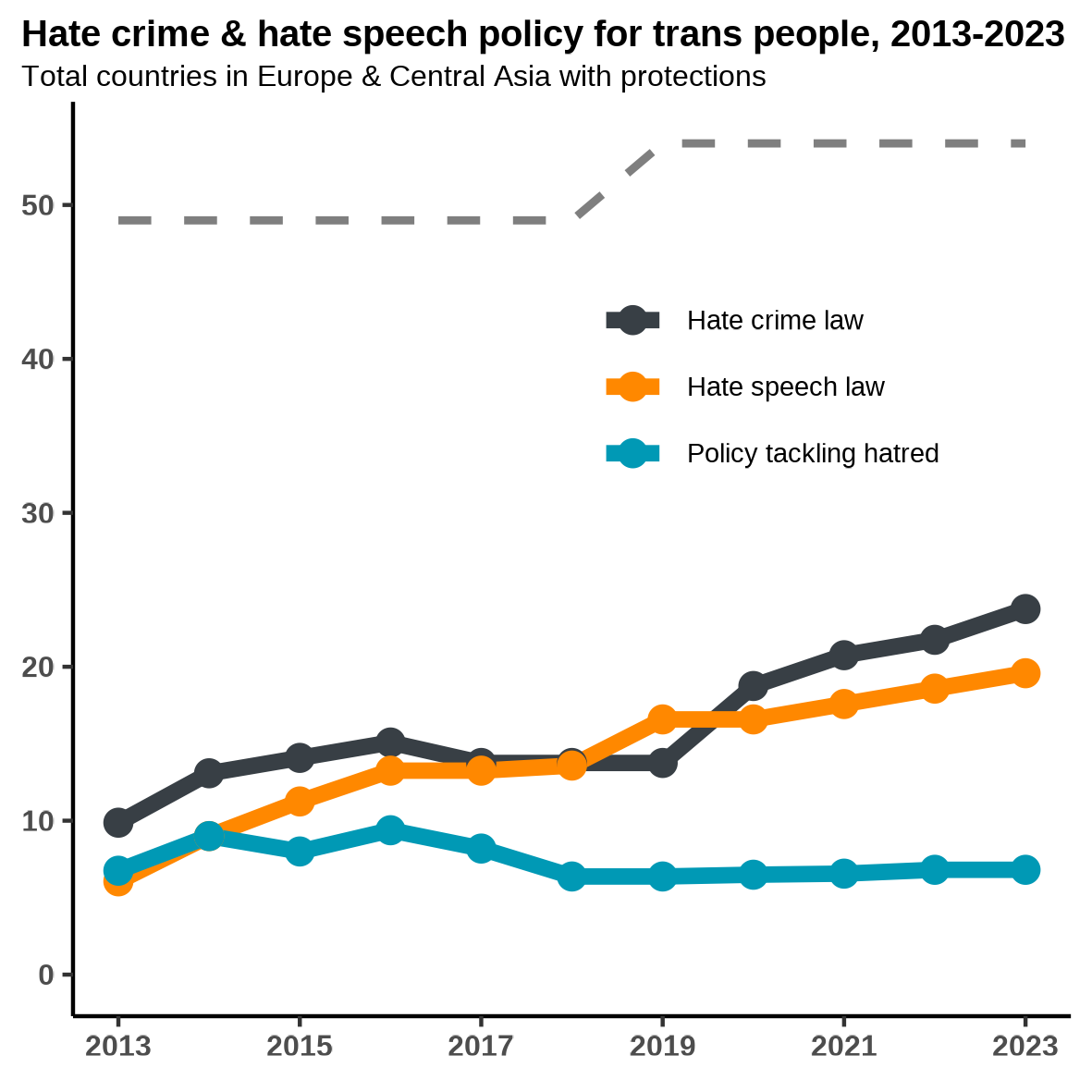
Non-discrimination
Non-discrimination is the area with the biggest and most continuous legal gains for trans people in Europe in the past decade. The number of states protecting against discrimination on grounds of gender identity more than doubled in Employment (2013: 14; 2023: 35) and almost tripled in Goods & Services (2013: 11; 2023: 30). Among EU member states, where these two protections are required by EU law, progress in recent years has stagnated, whereas non-EU states have made continuous progress. Likewise, there is overall steady progress in non-discrimination legislation in other areas, such as education, health, and housing.
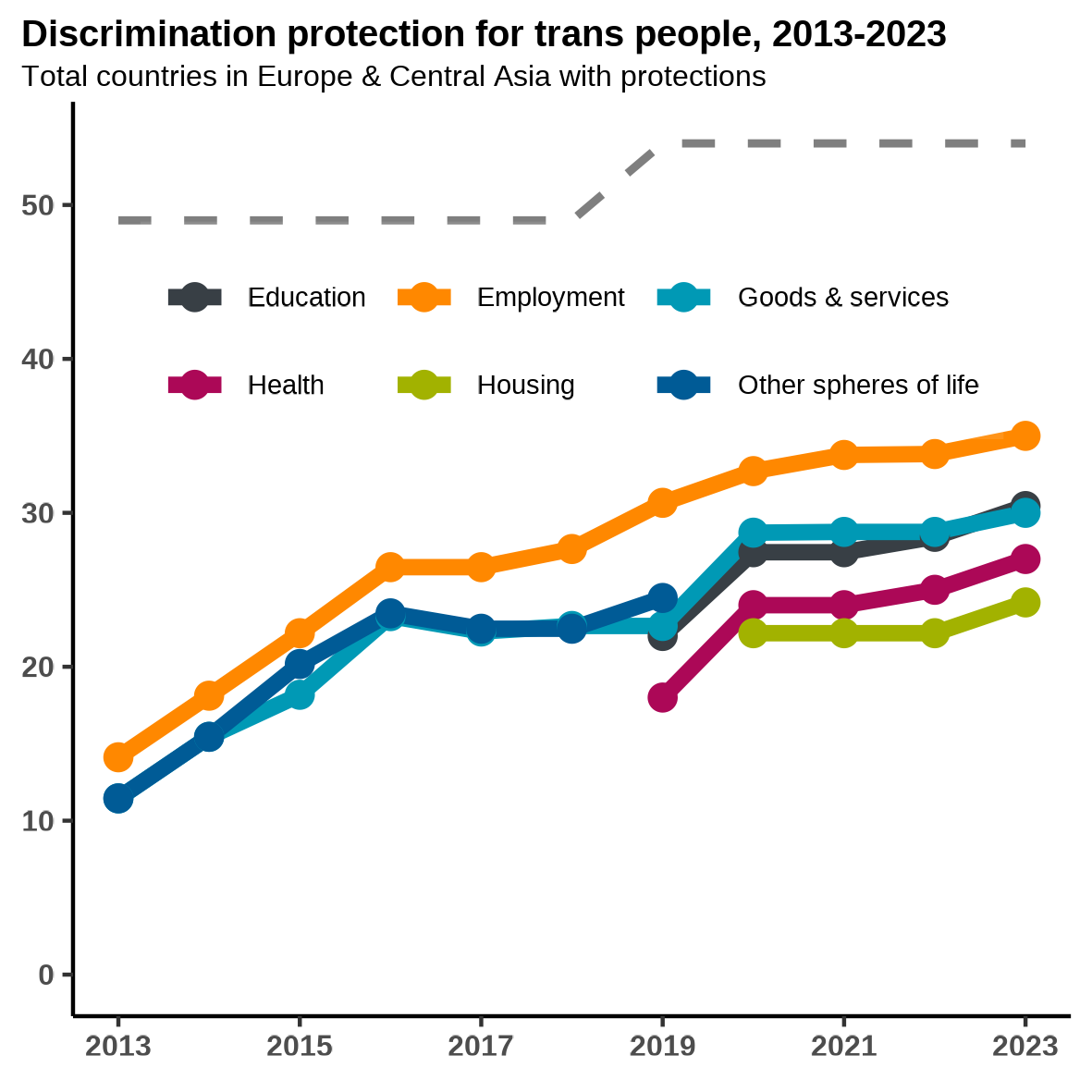
Equality policy
One area of concern is equality policy, with stagnation in the adoption and implementation of equality action plans. However, more countries now include gender identity in their equality body mandate (2013: 20 ; 2023: 32). Almost six times as many states now include gender expression as a grounds for discrimination as in 2013, when Croatia, Sweden, and Bosnia & Herzegovina led the way (2023: 17).
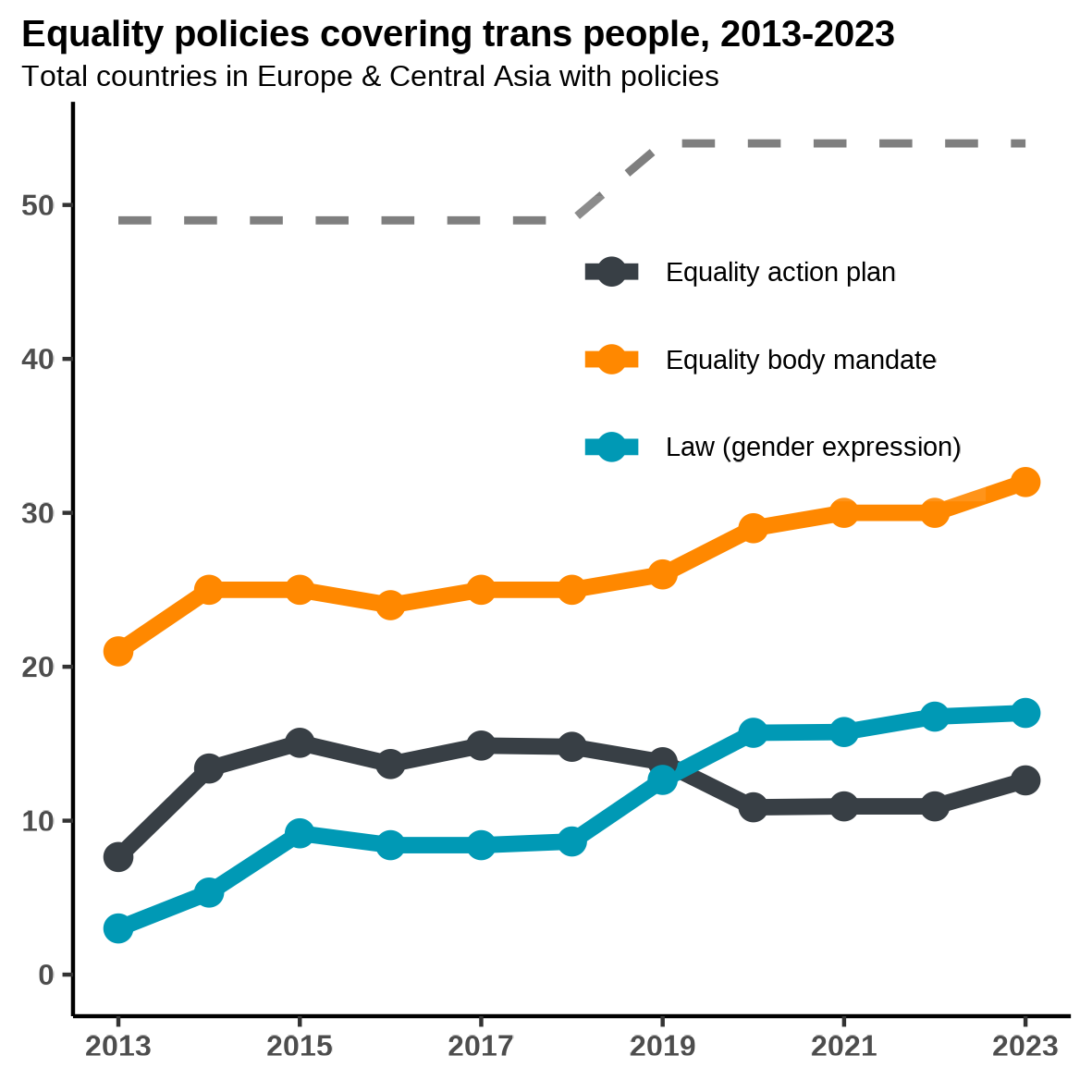
Family
Progress in the family category is painfully slow, although trans parenthood recognition is beginning to trend upwards. Sweden, Finland, Belgium, and Slovenia recognise trans parents’ names and gender on children’s birth certificates. Malta and Iceland go further and have laws that allow for recognition of trans and non-binary parenthood.
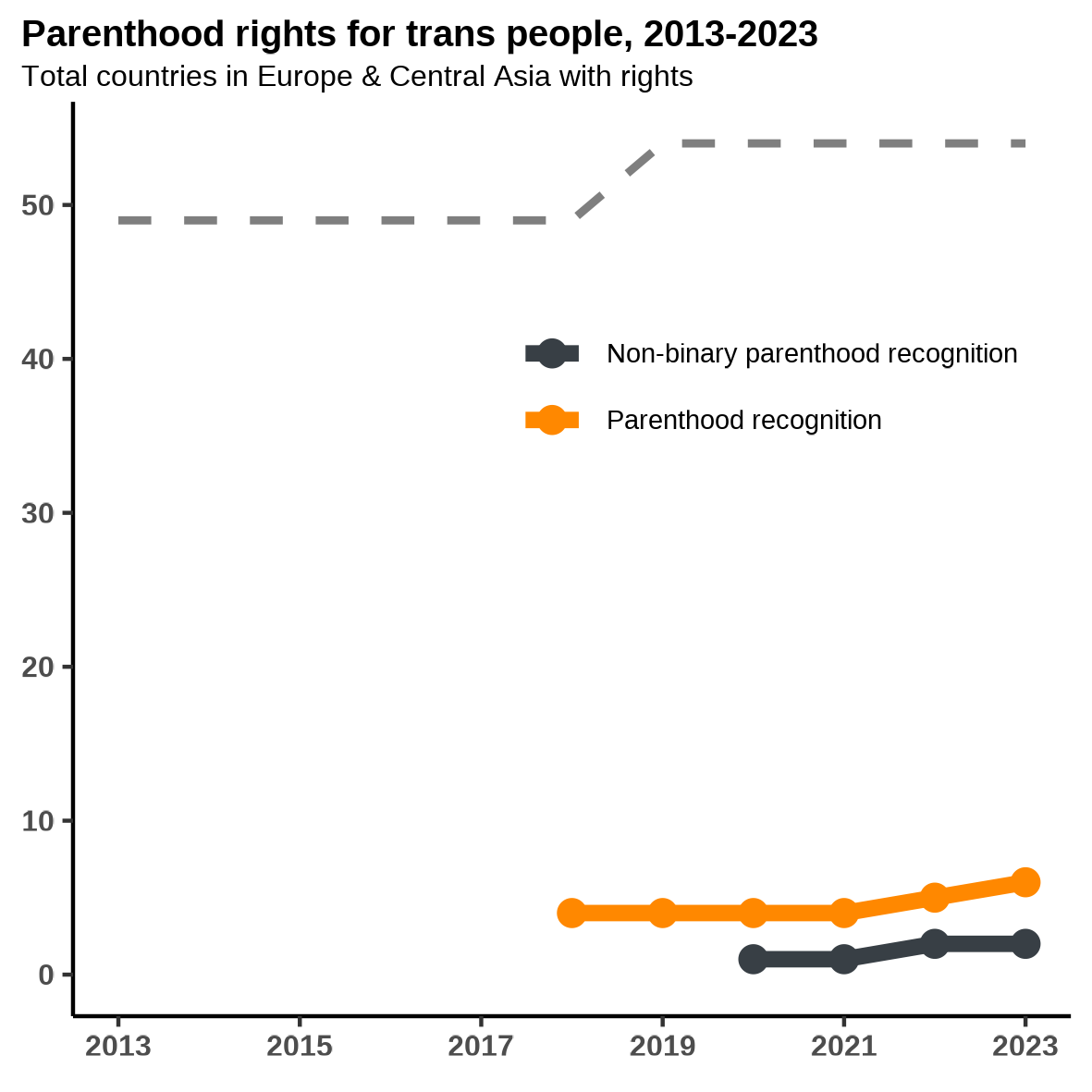
Health
Likewise, there is little advancement in trans-specific health policy, with healthcare systems failing trans people all over Europe and Central Asia. The full depathologisation of trans identities remains stagnant, with only Malta having achieved this. There is far more work to be done. Bans on conversion practices are slowly being introduced, though it still remains unclear how effectively these bans can be implemented.
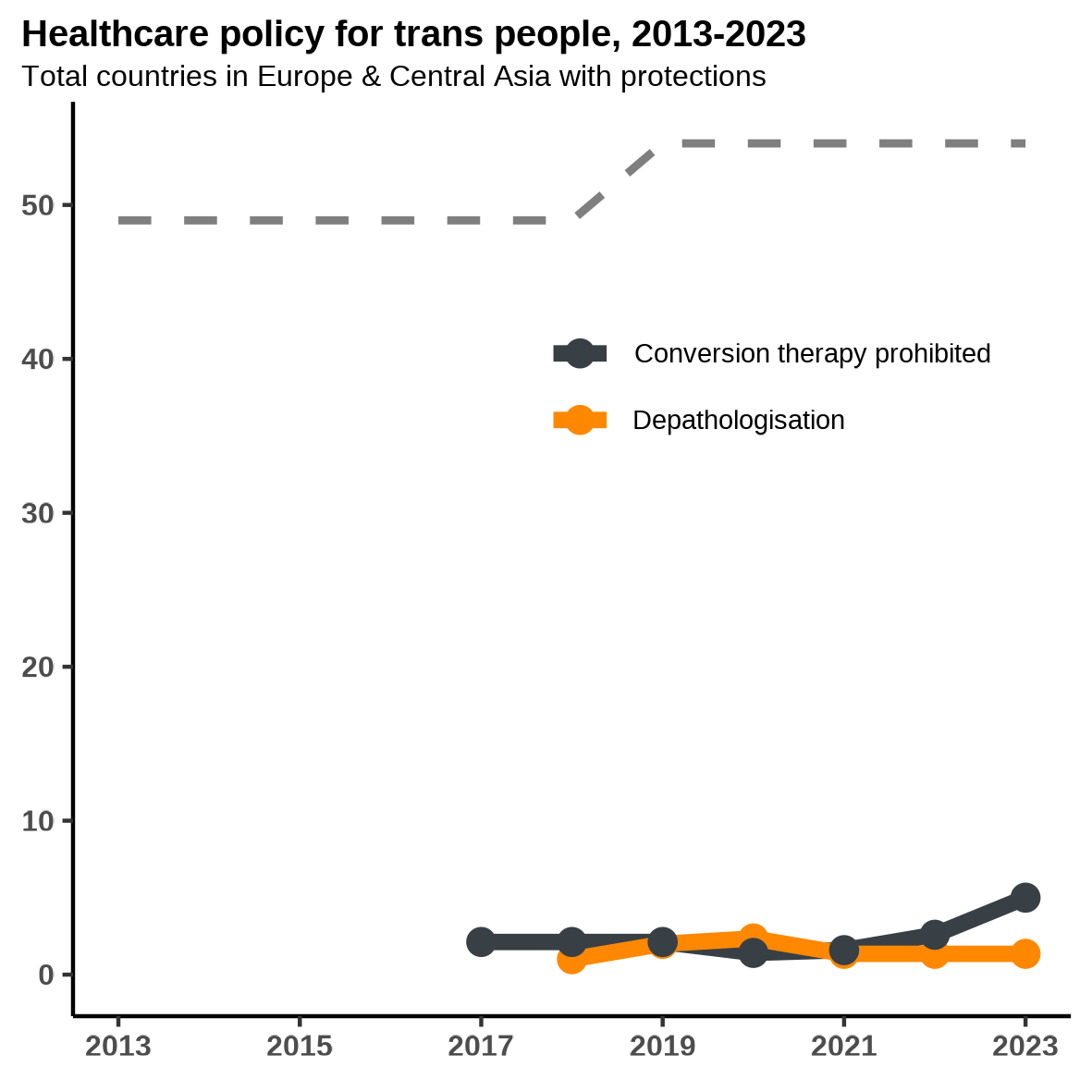
Regression
The United Kingdom and Hungary were at the top of the Trans Rights Index in 2013, but both have regressed since. In 2013, the UK met 3/4 of our legal indicators, but in 2023 it achieved less than half of the available points. Its ranking dropped from 1st in 2013 to 21st in 2023. Hungary lost 5 points since 2013, mostly due to the removal of access to LGR. Trans rights in Azerbaijan, Latvia, Romania, and Turkey have not progressed: in fact, all four have slightly fewer points today than in 2013.
Stagnation
A number of countries made few or no gains over the past decade, or progressed and then regressed again. Slovakia is threatening to regress further on progress made in LGR over the last ten years. Belarus and Russia have the same number of points today as in 2013. There is also stagnation in Central Asia, with only 1 point awarded (in Kazakhstan) since 2020.
Progress
Iceland, Malta, and Luxembourg are at the top in 2023, with major progress since 2013, when they all had fewer than 8 points. These three states met a further 18 policy indicators related to trans rights over the past decade. Other countries that have gained the most points over the last decade include Denmark, Finland, Norway, Slovenia, and Spain.
EU vs. Non-EU Progress
Over the past decade there has been a widening gap between EU and non-EU countries on trans rights. But this trend may be about to reverse: in 2023, more new points were awarded to non-EU countries than to member states.
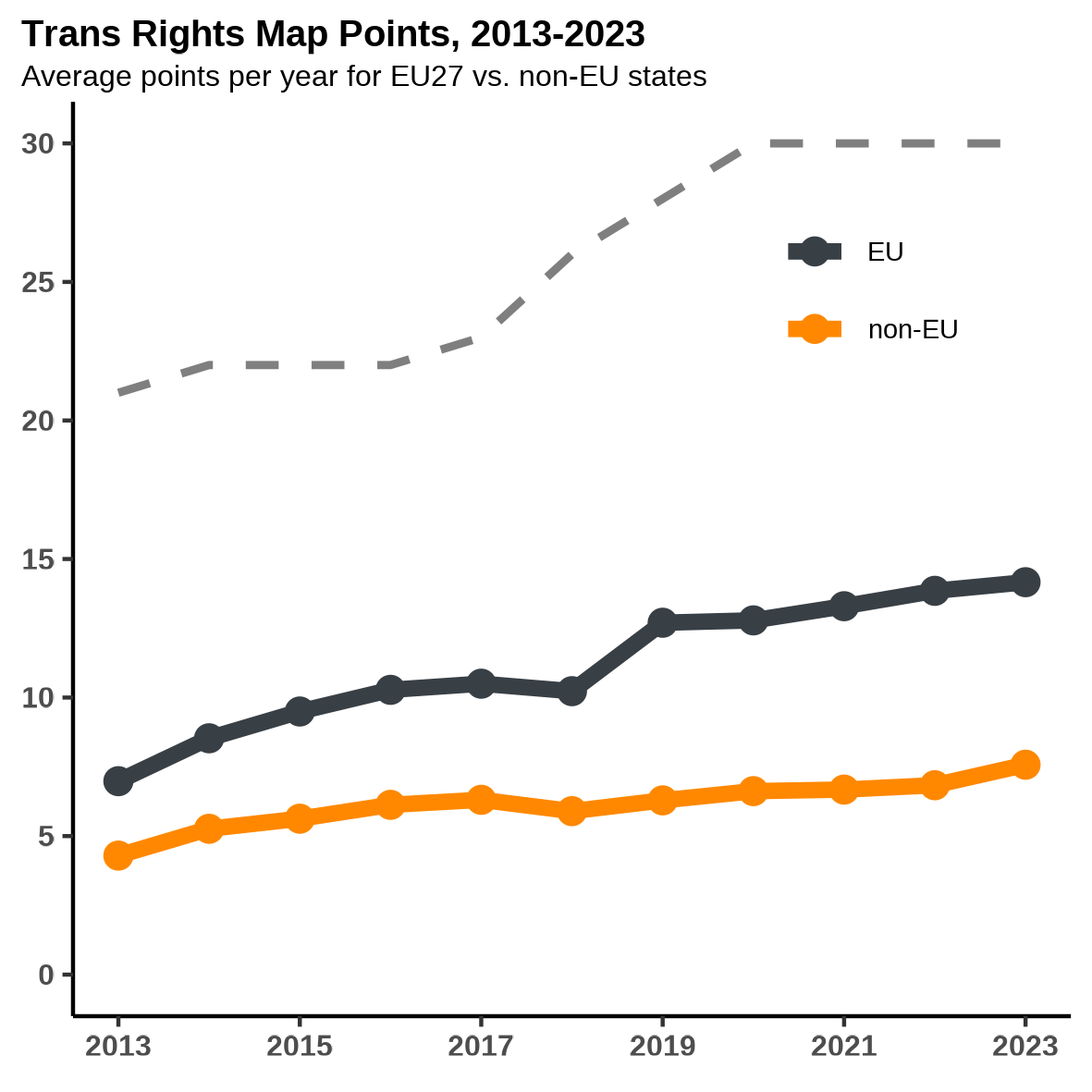
“The trans community can be proud of its achievements of the last decade. However, there is no time for complacency. To solidify the progress, policy makers and allies need to find the courage and respond loud and clear to attacks against trans people. The best way to fight the backlash is to go forward.“
Lenny Emson, Executive Director of TGEU
Freya Watkins, TGEU Research Officer, adds:
“Our data from the last ten years show that legal protections for trans people are on an upward trajectory in many policy areas in much of Europe, although there is little progress in Central Asia. The removal of restrictions on legal gender recognition and trans-specific non-discrimination legislation are the areas where most improvements have been made. However, we must not assume that progress is inevitable. The United Kingdom and Hungary have gone backwards, from progressive leaders of our Index in 2013 to places where anti-trans hatred is widespread in the media and government agendas. Ultimately, legislation means nothing without implementation. The past decade saw a big increase in states including gender identity in asylum protection laws, but in practice many countries continue to fail trans asylum seekers.“
The Trans Rights Index & Map is the most comprehensive analysis of trans rights in Europe and Central Asia to date, spanning over a decade of data collection. Started in 2013, it now illustrates the legal situation of 54 countries in 30 areas of trans-specific legislation. Central Asian countries were added to the map in 2019. This year, we added French and Croatian versions, to the previously available English, Russian, and Spanish. The map tracks six legal categories:
- Legal gender recognition
- Asylum
- Hate crime and speech
- Non-discrimination
- Health
- Family
Go to the Trans Rights Index & Map 2023 or check out our summary here.
In a hurry? Check out our Fast Facts
The Trans Rights Index & Map is made in collaboration with ILGA-Europe and launches on the same day as ILGA-Europe’s Rainbow Map and Index 2023.
Press Contact: comms@tgeu.org
Nadya Yurinova, Senior Communications Officer nadya@tgeu.org
Disclaimer
The data presented reflects the legal rights of trans people based on consultation from in-country experts as of 11 May 2023. The Trans Rights Map documents existing explicit legal protections governments are granting (or denying) trans people. It does not claim to exhaustively portray the complex realities of trans people’s lives.
Acknowledgments
We would like to thank the 100+ country experts who shared their knowledge and expertise with TGEU.
The Trans Rights Map is developed in cooperation with ILGA-Europe.
The interactive Trans Rights Map was designed and developed by Wolfox Studio.




